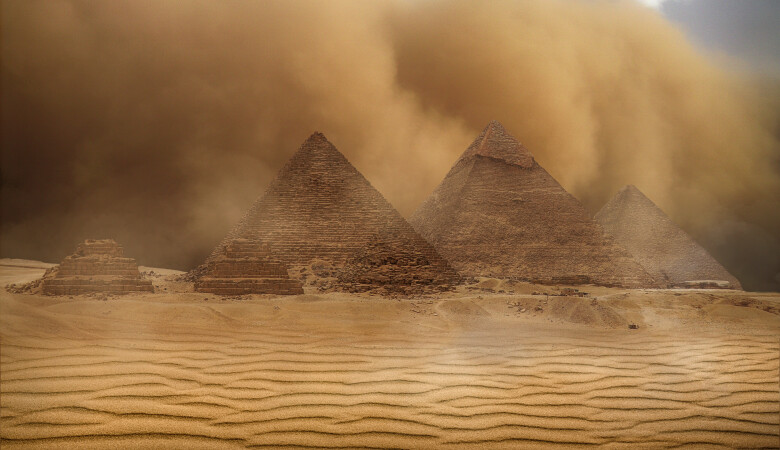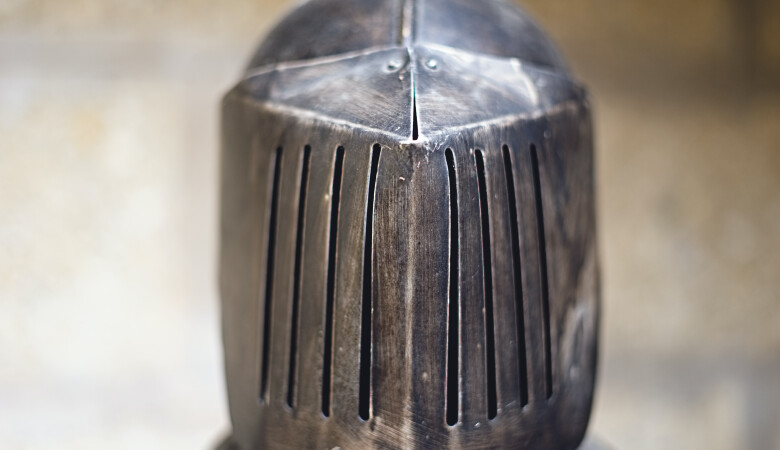Gods You Must Carry vs. a God Who Carries You (Isaiah Sermon 53 of 80)
November 09, 2014 | Andy Davis
Isaiah 46:1-13
Idolatry, Kindness of God
Andy Davis preaches a verse-by-verse expository sermon on Isaiah 46:1-13. The main subject of the sermon is the differences between the living God of scripture and worthless idols made by men.
- SERMON TRANSCRIPT -
So last week, my family was on vacation, and our church has a beautiful cottage in Ridgecrest, Rand Cottage, and over one of those beds, there is one of the most famous poems in the Christian experience. It's called "Footprints in the Sand." Have any of you ever seen that? All you have to do is walk into a Christian bookstore, and you'll see it. "Footprints in the Sand". It goes something like this, there are different versions, but it says this:
One night I dreamed I was walking along the beach with the Lord. Many scenes from my life flashed across the sky. In each scene I noticed footprints in the sand. Sometimes there were two sets of footprints, other times there was one only. This bothered me because I noticed that during the low periods of my life, when I was suffering from anguish, sorrow or defeat, I could see only one set of footprints, so I said to the Lord, “You promised me Lord, that if I followed you, you would walk with me always. But I have noticed that during the most trying periods of my life there has only been one set of footprints in the sand. Why, when I needed you most, have you not been there for me?” The Lord replied, “The years when you have seen only one set of footprints, my child, is when I carried you.”
Now, that image of the Lord carrying us through the hardest, the most bitter times of trial in our lives is extremely comforting and encouraging. And that, I think, explains the appeal of that poem and how much we yearn to have the Lord sustain us and carry us. I just don't think it goes far enough. I think there should just be one set of footprints all the time and they belong to Jesus, and He's carrying you all the time. Amen?
It's not like, "God, I got this now, I'm good. Uh-oh, I've got some trouble now, please pick me up. Okay, I'm fine, you can put me back down again." We heard from John 15, what Daniel read to us, "I am the vine; you are the branches. If a man remains in me and I in him, he will bear much fruit; apart from me you can do nothing." We rely on Him for everything. As the Apostle Paul said in Acts 17, "In Him, we live and move and have our being." But yet the comforting aspect of that poem is taught in Isaiah 46. Isn't it marvelous? The idea of a God who carries you through life, who sustains you, who nourishes you, who protects you, who gives you everything you need, is taught in Isaiah 46. He is the God who carries us. As the hymn writer put it so beautifully, "I need thee every hour, most gracious Lord," not just some of the hours of my life, but I need Him. I think it's what happens during those trials, we are most aware of God carrying us, we're most aware. When we think we've got it, that's actually where we're probably in greatest danger of being tempted, because we can become arrogant and we think that we can have some kind of existence apart from Christ, and we really can't.
So as we come to Isaiah 46, we're coming to a contrast between the true and living God of the Bible and how He has promised to carry us through our lives, versus the gods of the nations who must be carried. We have the gods of Babylon, Bel and Nebo, we're going to get introduced to them and get to know them briefly. You don't need to study much about Bel and Nebo because they're obsolete. We're going to talk about that, but they represent the gods of the nations, the idols of the nations who must be carried, and they are burdensome. They have to be carried. And so God is continuing here in this chapter, through Isaiah, His assault on the foolish wickedness of idols and idolatry. He directly contrast gods that you must carry, you've got to put them on a cart and they are burdensome to the oxen that dragged the cart, and they are burdensome to those that seek to carry them in their hearts, versus the God of the Bible who carries Israel and carries individuals, even to their old age and gray hairs.
So, in Isaiah 46, just to get a bit of a context here, Isaiah the prophet lived about seven centuries before Christ was born. And he was a prophet, which means he had a special gift from God to be able to hear the Word of God and the messages of God, and those messages could cover any topic. They could cover things in the past, things in the present, things in the future. But it's especially God's ability to predict the future that he has been highlighting again and again, and again in this chapter too. He's the God who declares the end from the beginning. This God raised up in history, in space and time, a nation, the Jews. And He focused His redemptive plan on that nation. He called them out of a barren couple, Abraham and Sarah. Abraham 100 years old when the miracle baby was born, Isaac, and Sarah, who was barren her whole life and well beyond the years of bearing children, God gave them a miracle baby, and from that miracle baby, Isaac, came Jacob, and from Jacob came the 12 patriarchs, and from them, came the nation of Israel. And God raised up that nation and worked through them in a very powerful and sovereign way. He brought them out with a mighty hand and an outstretched arm out of Egypt, out of bondage and slavery.
He endured their conduct for 40 years in the desert and brought them across the Jordan River through Joshua, to conquer the Promised Land and Canaan, in the very land He had told Abraham He was going to give to his descendants. But God warned them as they crossed that Jordan River that they were going there on condition that they keep His covenant. And if they didn't keep His covenant, if they especially worshipped the gods of the nations, if they followed the idols of the Canaanites, if they went after those false gods, God was going to evict them from the Promised Land. And sadly, they disobeyed. Though God warned them again and again through the prophets, they disobeyed. And so God had to evict the northern kingdom of the Jews, the 10 tribes, under the Assyrians and then a century-and-a-quarter later did the same with the rest of the Jews under Babylon. And so the Babylonians came in under Nebuchadnezzar, and they destroyed the temple, razed it and slaughtered just about everybody and a tiny group, a tiny remnant of Jews, about 4600 according to Jeremiah, went, a small remnant, went off into exile into Babylon. The rest died by the sword, famine, and plague.
And so a large number of the Jewish nation were slaughtered at a time by the Babylonians. Now, Isaiah the prophet is writing Isaiah 46, before that has happened before the Babylonian invasion has even happened, it's far off, a century away. And so, he's warning them but not only that, he's saying beyond the Babylonian invasion, God is going to work out a retribution and a judgment on Babylon and he's going to destroy Babylon by Cyrus the Great, leading the Medo-Persian army. They're going to come in and they're going to destroy Babylon and a small remnant of Jews is going to be permitted to go back to the promised land and resume Jewish history there, rebuild the city of Jerusalem, rebuild the temple and continue redemptive history which eventually led to the coming of Christ, our Savior.
And so God is working out this vast, this amazing plan, but He stops in the middle, here in Isaiah 46, to talk about the gods of the nations, and specifically the Babylonian gods. Now the way it worked back then in the ancient Near East, the way an invading army would think, is that they came in the power of their gods and they really did believe in this, they were polytheists and they thought that their gods would prove themselves to be more powerful than the gods of the nation they were defeating. And so Sennacherib, when he came with the Assyrians said that, "Who of all the gods of any of the nations that we've defeated has been able to stop us?" And so, they think this way. And so the military battle on earth, shows a greater battle in the heavens and it shows proof that their gods were more powerful than the other gods. Well that's true, I guess in the polytheistic way of thinking, if you believe in that, you just look at what's happening on the earth.
But we know there is only one God, and God is orchestrating His purpose. And when Israel was defeated it wasn't because God was defeated by Bel and Nebo, the Babylonian gods. And so before any of that even happens, God says, there's going to come a time that Bel and Nebo, the gods of the Babylonians, are going to be destroyed. They themselves are going to go off into exile. Now, the word "Bel" is related to Baal, there's a similar mythology between Bel of the Babylonians and Baal of the Canaanites, they're similar. He's also called Marduk, sometimes, his son is Nebo in the mythology. You get "Bel" in the names like Belshazzar, and Belteshazzar in the Book of Daniel, you get Nebo in Nebuchadnezzar, his father Nabopolassar, these are the gods of the Babylonians.
And so what God is saying here is that He is more powerful than any of the gods of the Babylonians, He's going to prove that in space and time, by orchestrating their defeat and their destruction. That's what He's saying, and He predicts it ahead of time, so that when it comes, they will say, "Okay this is the very thing you said was going to happen. But beyond that, He's looking at Bel and Nebo, these idols, these gods, as crushing burdens. Idols that crush us. And so what I'm going to do is I'm going to talk about that. I've already mentioned it in space and time, how the Babylonians worship these things, but I'm going to go and apply it to us as we've been doing to talk about our idols and our struggle with idolatry. And how Christ alone can set us free, so that's where we're going.
I. The “gods” of Babylon a Crushing Burden, Crushed in the End (vs. 1-2)
So let's look, verse by verse, and start up at this section here in Isaiah 46:1,2. The gods of Babylon are a crushing burden, and they are themselves crushed in the end. Look at verse 1 and 2, "Bel bows down, Nebo stoops low. Their idols are borne by beasts of burden. The images that are carried about are burdensome, they are burden for the weary. They stoop and bow down together, unable to rescue the burden, they themselves go off into captivity." So Bel and Nebo, these gods represented by their idols made of stone, probably covered with silver or gold, are depicted as crushing burdens for their weary worshipers. I think Isaiah sees a kind of procession here, maybe a religious procession or maybe it's just the Babylonians, fleeing for their lives, like refugees.
And so they're going to put Bel and Nebo on a cart and that cart becomes very heavy with these idols. They're covered with very heavy, precious metals. Silver and gold are dense, they're heavy. And the idols are big and it's heavy, and so there's this procession. They're called burdensome, they're called a burden for the weary. And the weight of these idols is wearying to the beasts of burden, perhaps the oxen or other beasts of burden that are carrying these things out of Babylon. It's wearying work and isn't it amazing that their gods, the gods of Babylon, need to be carried at all?
Our God is omnipresent. Wherever you go, He's already there and has been there since the beginning of time. There is no place where God is more than He is in another place, that's what the doctrine is of omnipresence. He is everywhere. I've likened it to... And He's not like an AM radio station. You guys probably, many of you don't even know what that is. When was the last time any of you listened to AM? But you know the signal's strong or weak, or you go under a bridge and it's gone, and then you come back out, forget it. But that's what AM used to be like, that's what it still is like. But the idea is, there's a stronger, weaker sense of the signal. That's not what God is like, God is equally strong everywhere, He is fully everywhere in the universe. And so He doesn't need to be transported, and so a number of these images, prophetic images of God show Him as, in Daniel 7, having a chariot with wheels. A chariot with fire, with wheels. Ezekiel even has wheels within wheels going in every direction, He moves, He is everywhere, and their gods need to be carried and even worse for their worshippers, their gods Bel and Nebo can't do anything to help them.
They're completely discredited by this military defeat, by the crushing defeat of the Babylonian army and by the defeat of the walls of Babylon. Bel and Nebo are exposed as unable to save their people from Cyrus the Great and the Medo-Persian army, and so off they go into captivity, verse 2, whatever remnant is left of the Babylonians, will carry whatever idols of Bel and Nebo that are left after the conquest into captivity. Bel and Nebo could not save their people in the end. They couldn't save them at all, and like all idols in the end they fail their worshippers. Like all idols in the end they fail their worshippers.
II. The Incomparable God Carries His People from Birth to Old Age (vs. 3- 5)
The next section in verses 3-5, the incomparable God carries His people from birth, even to their old age. Look at verses 3-5, "Listen to me, O house of Jacob, all you who remain of the House of Israel, you whom I have upheld since you were conceived, and have carried since your birth, even to your old age and gray hairs, I am He, I am He who will sustain you, I have made you, and I will carry you, I will sustain you and I will rescue you. To whom will you compare Me or count Me equal? To whom will you liken Me that we may be compared?"
So the prophet Isaiah here is calling across a century and a half, to the remnant of the Jews that will be alive at the time of Cyrus the Great's invasion. And he's calling to that remnant what's left of the house of Jacob, what remains of the House of Israel, He's calling to that remnant. The Jews, as I said, had been sent into exile by the punishment of God because they had worshipped idols, because they had followed the gods of the nations and they violated God's covenant, so He punished them and sent them. But this remnant was sent and He protected them, and He would not allow them to be assimilated into Babylonian culture, they maintained a Jewish identity like Daniel himself and Hananiah, Mishael, and Azariah, we know as Shadrach, Meshach and Abednego. They maintained their Jewish identity, protected them as a Jewish nation there. And He says that He is the God who upheld them since they were conceived, who carried them since their birth and who promises to continue to do this for them even to their old age and gray hairs. And so it was God that conceived the Jewish nation through Abraham and Sarah.
When Abraham's body was as good as dead and Sarah's womb was dead, and God created a miracle baby Isaac and he raised up out of nothing a Jewish nation, He conceived them and He has been watching over the nation as a whole every day, and not only the big picture of the nation, but every individual member of it, every individual Jew, and we can extend that to us. It was God that knit you together in your mother's womb, that carefully put you together. And in Him, you live and move and have your being, it was God, it is God who has sustained your existence every day, you have no existence apart from God, whether you believe in Jesus or not, you have no existence apart from the God of Abraham, Isaac, and Jacob, apart from the God and Father of Jesus Christ. No existence apart from, He has been sustaining your existence.
And He promises to continue to do that even to your old age and gray hairs. And for us, as believers in Christ, how precious is it to know that the same God who has not only caused you to be born but now through the gospel has caused you to be born again and He has given you a faith, and He will sustain that faith through all of your trials, even to your old age and gray hairs, He's going to watch over you and how marvelous is that? And He will rescue you even to the very end. So who then is like God? Who can you compare this God to? Certainly no idol, certainly not to Bel or Nebo, not at all.
III. The Idols Cannot Move, Neither Can They Save (vs. 6-7)
There is no one like him. Verses 6 and 7, The idols cannot move, neither can they save, it says there in verse 6-7. "Some pour out gold from their bags, they weigh out silver on the scales, they hire a goldsmith to make it into a god, and they bow down and worship it, they lift it to their shoulders and carry it, they set it up in its place, and there it stands. And from that spot, it cannot move. And though one cries out to it, it does not answer. It cannot save him from his troubles."
So Isaiah 44, we've already seen the trip into the idol maker's shop, the workshop, you remember that guy, the guy who took the chunk of wood cut it in half; and half of it he used to cook his dinner and the other half he used to make a god and bowed down and said, "Save me, you're my god." So we get just a very brief trip into the craftsman's shop this time. Maybe a wealthy individual comes and says, "I'd like you to make me an idol," and some gold and silver are weighed out. And so, the idol maker crafts it. What's amazing to us in all of this is the Bible teaches it was God that crafted the craftsman. It was God that made that man, it was God that made the men and women that are worshipping these idols, and this god that has been contracted to be constructed, this god is a motionless god. Wherever you put him that's where he stays.
And if you're running from your life as a Babylonian and you're going into exile, you better bring him with you because he's not coming unless you get him. He's a burden. Wherever he goes, he's a crushing burden, he's weighing you down. You got to carry him wherever you go. And though you cry out to Bel or Nebo they cannot save you, that's what he's saying.
IV. Remember the God Who Plans and Orchestrates History (vs. 8-10)
Now, in verses 8-10, God calls on His people to remember Him. He says, "Remember this, fix it in mind, take it to heart, you rebels. Remember the former things, those of long ago. I am God and there is no other. I am God and there is none like me, I make known the end from the beginning, from ancient times what is still to come. I say, My purpose will stand and I will do all that I please.
Praise God. So this is a call on God's people. Not just that generation but every generation to remember God. To remember Him, and to repent. He calls on these rebels, He calls them rebels there in verse in verse 8, "Remember this, fix it in mind, take it to heart you rebels." Remember and repent. Our God is a God who has acted in history. Remember how He called Abram out of Ur of the Chaldees, remember how He gave him that baby, that miracle baby when he was 100 years old. Remember how he gave to Isaac, Jacob when his wife was also barren, Jacob and Esau, and He chose Jacob and remember how He gave Jacob the 12 patriarchs and remember how God caused the nation of the Jews to be greatly multiplied, even in bondage in Egypt to the point where there were several million people, they were as numerous as the stars in the sky, and as countless as the sand in the seashore, as God had promised Abraham they would be. And remember how God intervened through Moses, to bring them out of that nation with a powerful hand and an outstretched arm. Remember the plague on the Nile River, remember how God turned all the freshwater in Egypt into blood, even the water that was in the pitcher on the table, turned it into blood.
And remember how He brought the plague of the frogs and the gnats and the flies, and all of that, the plague of hail and boils and darkness and all of these plagues, God brought, judging the gods of Egypt and working on Pharaoh's heart, so that God would do all 10 plagues, including the dreadful final plague, the plague on the firstborn, which the firstborn of the Jews were only spared by the blood of the Passover lamb, which had been painted on the doorpost. Remember all of that, don't you remember what God has done for you? And then how God led you by a pillar of fire and a pillar of cloud and how He brought you to the edge of the Red Sea and how Pharaoh came in his chariots and his soldiers, the most powerful military force on earth at the time, and how they trapped you against the Red Sea, and you cried out to the Lord; and the Lord said, "You don't need to do anything, just stand still, and see the salvation of your God."
And so God went between the Pharaoh and his mighty army and these defenseless Jews with a pillar of cloud and fire and He gave light to the one side to the Jews, and darkness to the other all night; and they crossed and He opened up a way in the Red Sea, and they crossed as on dry ground. But when Pharaoh tried to follow, they couldn't, and they were destroyed by the same waters. Remember all of that, and remember how God endured your rebellion in the desert and remember how God descended in fire on Mount Sinai and God spoke to you, and you heard Him speak, you heard the voice of God. Not through a prophet, directly you heard Him speak the 10 Commandments and God gave you His covenant. And remember how 40 years later, after your rebellion God opened a way through the Jordan River and remember how you crossed that river, remember Jericho and the walls fell down, and God gave you the promised land. Remember that and all the things God's done since then. Remember these things. Fix it in your minds and hearts.
Our God is a God who does these great works in history, the lifeless idols Bel and Nebo haven't done any of those things. But the Jews were rebels, he says, Who are lured by these idols, who are bowing down to them. God is the God who alone declares the end from the beginning, He's the one who predicts the future, He says what's going to happen. And He says in verse 10, "My purpose will stand and I will do all that I please." This dear friends is one of the greatest clearest statements of the sovereignty of God in the Bible. Look at it again, look at verse 10, at the end. "I say 'My purpose will stand and I will do all that I please.'" The sovereignty of God is a doctrine that God rules like a king over everything that happens on the face of the earth, He is sovereign over everything that happens on the face of the earth, and that's precisely why He can predict the future because He's ordained it from before the foundation of the world, and He is omnipotent, no one can stop Him from doing what He wants to do.
And so what God pleases, what He thinks is best, what He thinks is wise, that He will do, and no one can stop Him. And what He pleases, is He pleases to save a remnant of people from every tribe and language and people and nation, out of their wickedness and their idolatry and their sin through the shed blood of his son Jesus Christ and through the resurrection of Christ and by the gift of the Holy Spirit to save them out of their wickedness and their rebellion into an eternal state of glory where they'll be in resurrection bodies in a beautiful, perfect world, worshipping Him clearly forever. That's what He pleases to do. And all of these details of history, they're just part of that grand overarching plan. God is going to achieve every detail. Look at Verse 10 again. I say my purpose will stand and I will do 70% of what I please. Is that what it says? I will do... I'm working up toward 90%, I'm hoping to get 90% down of my plans today. No, God does all that He pleases, 100% of it. And nothing can stop it.
V. God’s Plan: Bringing Salvation Near to Those Far Away (vs. 11-13)
And so in verse 11-13, we have God's wise plan, and that is bringing salvation near to those who are far away. Verse 11, He says, "From the East, I summon a bird of prey from a far-off land, a man to fulfill my purpose. What I have said, that will I bring about. What I have planned that will I do. Listen to me, you stubborn-hearted, you who are far from righteousness. I am bringing my salvation near, it is not far away. My salvation will not be delayed, I will grant salvation to Zion, my splendor to Israel." Now we look at that through the narrow lens of the immediate historical context. The bird of prey that's coming is Cyrus the Great. We've already met him earlier, he's coming from a distant land, and he's going to destroy Bel and Nebo, he's going to destroy Babylon. But look what He says, "From that distant land, from the East, I will summon this bird of prey."
So you think about someone who trains a hawk or a falcon. You see them wearing like a leather glove. I've read about this, I've never seen it, but they take this bird of prey, and they put a hood on it. And they keep it from seeing and they feed it little bits of meat and they've got a leash on its talons and it's got its sharp talons and it's digging into the leather glove, not into the wrist of the falconer. And he's training it how to come back to him and what to do, and train little by little, and he is in charge of this bird of prey. And God is doing that with this great military conqueror the Cyrus the Great, He raises him up from nothing, trains and prepares him within his own nation and brings him against Babylon. You're like, "Can God do that?" Yes, He can, that's what He can do. He is the sovereign King of every nation. And from these, verse 11, He's going to summon this bird of prey to do His will, what He has purposed, that will He bring about, He says it very plainly. But the purpose of all of this isn't ultimately to do these little tricks in history, that's not it.
What is He doing here? What is the purpose of all of this? It is salvation. He says it again and again, My purpose is to bring salvation. "Listen to me," He says, "You stubborn-hearted, you who are far from righteousness." Now just stop there just for a moment and understand what's being said that, you're far from Me, God is saying. I'm a righteous God and if you're far from righteousness, you're far from Me, and you're stubborn-hearted and you're rebellious and you're idolaters. So listen to Me, faith comes by hearing, I'm communicating to you. And you're far from righteousness, so I'm going to bring righteousness near to you. The Bible says in Romans 3, "There is no one righteous, not even one. There is no one who understands, no one who seeks God. All have become worthless. There is no one who does good, not even one." We were all naturally far from righteousness. And so what God is doing in history is bringing salvation near to us, who are far away, not just the Gentiles, but the Jews also, who are far from righteousness.
And so by the birth of Jesus Christ and by the life of Christ and the death of Jesus Christ and His resurrection, He is bringing righteousness near to us, who are rebels. Righteousness close to us who are far away, and for what? So that He can shine, radiantly in Zion, that's what it says at the very end. Zion as that city where God will dwell together with His people. Physically Jerusalem over and over in the Old Testament, Zion equals Jerusalem. But bigger picture, it's the new Jerusalem, the city where God will dwell with His people forever.
VI. Applications
Alright, so that's the chapter. What applications can we take from this? Well, first I just want to ask, as you walked in here today, what did you drag in here with you? What idols are dragging behind you? What are you chained to that is dragging you down? And we've been looking at this for weeks now and I think it's still something each of us underestimates. What Bel and Nebo are you chained to? Now, you're like, Bel and Nebo who worships them? Nobody does. That's the point. All of the idols are going to be discredited in the end, all of them. Everything you live for. Any created thing, anything that captures your heart, that becomes the focus of your life, that isn't the God of the Bible is an idol. So it could be gods, could be the gods of the Hindus or the Buddhists, which are crafted from human imagination induced by satanic influences. The gods of the Hindus or the Buddhists, Allah of the Muslims. It's not the God of the Bible, it's not the true God, but it's more than that. We have our heart idols as we've been talking about.
So, what's yours, what did you struggle in here with? Perhaps it's money, perhaps you're living for money. So it's a very powerful idol. You're living for a greater income, a more comfortable lifestyle? Staggering under the weight. I want you to picture yourself, you who struggle with the idolatry of money, swimming from a sinking ship, trying to make it to shore. And you've got a small box of gold coins. It's not huge, so it's manageable, so you think. And it's under one arm and you're swimming with one arm. But you're not making it, and you're getting tired and you're getting sunk by the weight of this idol. That's what it's like, it sinks you, these idols drown your soul.
Paul specifically warned against the love of money. Says in 1 Timothy 6, "…godliness with contentment is great gain. For we brought nothing into the world, and we can take nothing out of it. But if we have food and clothing, we will be content with that. People who want to get rich fall into temptation and a trap and into many foolish and harmful desires that plunge men into ruin and destruction. For the love of money is a root of all kinds of evil. Some people, eager for money, have wandered from the faith and pierced themselves with many griefs."
So because of a love of money, some of you may be working far too many hours in your job seeking to please your supervisor. Because you're not content with a simple lifestyle perhaps you have a high credit card debt and you're paying a good chunk of your money in interest to Chase Manhattan or to Discover, so you're working on their plantation, you're indentured servant to them and they're getting wealthy on you. And why? Because you couldn't be content with a simple lifestyle.
Because you're not content with a simple house, you're tempted to overreach yourself on a mortgage and you're paying too much every month on a mortgage, it's weighing you down. Because you're not content with simple meals, you eat out too much and the root at the root of all of this discontent is idolatry. Perhaps your idol is work, it's achievement and accomplishment. You're a beast of burden to relentless ambition to achieve things. Maybe you're a workaholic you're a driven person and you're addicted to the good feeling that comes from the checklist, and getting all of those things checked off. Or maybe it's society's checklist or it's an institution, a university's checklist, and you get that checked off, you feel good about yourself. Maybe you're just a neat freak and you just like to have everything in perfect order. I'm not that way, I'm not totally the other way, but... But to some people, it just... Everything has to be perfect. And so, you derive your sense of worth from achievements and accomplishments. These are idols on a cart that you're dragging behind you. But there are others of you that are exactly the opposite way, you don't actually achieve a lot in your life.
Your idol is pleasure, comfort, ease and perhaps sleep. The Bible describes the sluggard in the Book of Proverbs, and you just live for that, you live for ease and pleasure and comfort and you just enjoy that kind of lifestyle. You're the sluggard who can never sleep enough, you need to have somebody move your hand from the dish up to your mouth and help you eat like your mama did, it's held you back all your life because you love ease and comfort, the taking the path of least resistance. You're an under-achiever and you fail to meet the normal expectations of life because of this idolatry that in which you're preferring yourself and comfort and ease. A subset of that is just the love that we Americans have for food, it's just amazing how many restaurants there are in any city or any within... How many are there within five miles of this place? And they're growing popping up all the time. Now, again, there's nothing wrong with loving food or loving good food, the issue is, is it what you live for? Overeating, over-indulging.
Perhaps your idol is power and control, you just enjoy dominating the people around you, or perhaps you live for the approval of other people, you just every day someone else has the keys of your heart and you have to please them and make them happy and you live for approval and you're frustrated when you don't get it. You'll do things, serving things, whatever, and if the people don't notice it, you get frustrated and angry and irritable, and prickly about it. Some people make an idol of their bodies, they live for physical fitness, alright, they go to the workout gym and achieve personal goals all the time. They have mirrors up on the walls. Have you seen it? The mirrors and people pose in front of them, I've been told. I've not been to a gym, I don't, I don't do the... I do more cardio stuff, but you can tell... Just never mind, I'm not going into all of that, but... "Yes, pastor, we know you're not into physical fitness."
But no, they just live for being able to see their ribs or the washboard, the six-pack, something like that, or on the other side, just looking for, looking at physical beauty, the hair, the face, the makeup, the jewelry, the look, the fashion, all of that, and that's an idol, and you're dragging it behind you like a heavy weight all the time. And it gets even worse as you age, and some people will fight with cosmetic surgery or Botox or all that, but they're fighting the aging. The Scripture says, "Even to your old age and gray hairs… I will sustain you." But they're fighting that. Or perhaps your idol is something more secret, more shameful, something you haven't told anyone else about. There could be people here that are struggling with addictions to pornography or to alcohol or to drugs and these idols are like 100-pound weights and they're dragging your soul down, perhaps even toward hell. And you don't know how to be free from all these burdens that you dragged in here today.
Christ can set you free. Praise God. Jesus says, "Everyone who sins is a slave to sin… But if the Son sets you free, you'll be free indeed." Hallelujah. Christ came to take the guilt for all of your idolatries, up to this very moment, and to the end of your life on Himself. He isn't a burden, He carries your burdens. He takes all of your guilt and your sin and your disease and suffering on Himself and He went to the cross, and He died in your place that you might have eternal life. So trust in Him. Put your trust fully in Christ. And for you who are already Christians, continue to trust in Christ crucified and resurrected for the severing of the chains of these idols you've been dragging your whole life, your whole life, trust in Him. And trust in Him for the rest of your lives.
Look again at Verse 4, "Even to your old age and gray hairs, I am He. I am He who will sustain you, I have made you, and I will carry you, I will sustain you, and I will rescue you." Do not fear the future. God will carry you every day of your life, until at last, He takes you into glory. He's going to save you and rescue you. And when you are the most burdensome, when you are the most dead weight, when your corpse is in the grave, He will come to your grave and He will call you from the grave and you will come to life in a resurrection body and you will live forever. He will lift you up out of death and give you eternal life. As He said very, very plainly, and I love this, "My Father's will is that everyone who looks to the Son and believes in Him shall have eternal life, and I will raise him up at the last day."
This past week Brittany Maynard took her life, you know that story about her, public suicide, and she was doing it in the name of death with dignity. Can I just submit to you that Christians alone know how to die with dignity. Because Jesus showed us how. The grave isn't the end, it is appointed to each one of us to die once and after that, to face judgment. We are freed from wrath and judgment. Amen, hallelujah. We're freed from that, and God is going to raise us up. We can get old age, gray hair, all of that with dignity because God is going to raise us up in a resurrection body so glorious we're going to shine like the sun forever and ever. Close with me in prayer.































